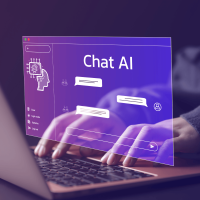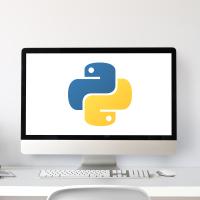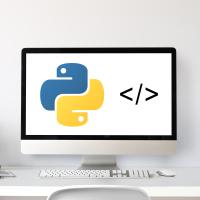IBM Applied AI Professional Certificate Online
Develop practical skills in Python and IBM applied AI thanks to deep learning courses that show you how to design, build and deploy AI-powered apps.
Franklin University has partnered with Coursera Campus to provide cutting-edge certificates to learners seeking to advance. Courses are open to all learners. No application required.
Included in your subscription
Get unlimited access to over 7,000 offerings found on the Coursera website – including guided projects, specializations and professional certificates offered by hundreds of leading universities and companies. You also get access to all 39 professional certificates found in the Franklin Marketplace.
LEARN MOREWhat You Will Learn
- Gain an understanding of artificial intelligence (AI) concepts, including machine learning, deep learning and neural networks
- Use IBM Watson to develop and deploy chatbots and virtual assistants
- Learn Python programming basics, including working with data and solving real-world problems
- Develop AI-enabled apps, create interactive information retrieval systems, and build and run unit tests
About the IBM Applied AI Professional Certificate
Let this IBM Applied AI Professional Certificate kick-start your AI career. Through the six courses in this program, you'll learn the in-demand skills needed by AI developers and professionals, including Python, IBM Watson AI services, and APIs.
This specialization is ideal for those looking to explore machine learning and computer vision techniques in applying AI and AI-powered solutions to support smart devices, valuable data and efficient Cloud-based tools.
Through self-paced coursework and hands-on projects, you’ll gain a better understanding of the transformative power of AI and its application and use cases. You'll also create and deploy a variety of smart solutions, including a chatbot, computer vision web app, and speech-enabled virtual assistants for social media.
This Professional Certificate program is ideal for individuals who like to learn, grow, and experiment, and who have a passion for innovation and technology. Upon completion, you'll be prepared to pursue a variety of AI-focused career positions, including ML engineer, AI developer and data engineer. Plus, you will have earned the widely recognized IBM badge that demonstrates your proficiency in the emerging technologies of AI.
Required IBM Applied AI Professional Certificate Courses

BEGINNER | Computer Science | Self-paced | 14 hours
Are you curious about the lucrative field that is software engineering and how you might be a part of it? This is the course for you! By taking this course you will gain foundational knowledge of software development, programming, and the many exciting job roles and career paths that the IT industry offers. Learn about the power of the Software Development Lifecycle (SDLC), and modern software development frameworks methodologies like Agile and Scrum. Explore fundamental programming principles and foundations of design, architecture, and deployment. The course offers a number of labs that will help you get important hands-on experience. These include, getting started with an IDE, basics of programming in Python, and Hello World in 10 languages. The field of software engineering is growing at an estimated rate of 22% according to the US Bureau of Labor and Statistics. In addition to aspiring software engineers, front-end, back-end, full stack developers and DevOps professionals, this course is also suitable for those in related careers such as Product and Project Managers, IT Managers, Information Developers, UI/UX designers and others who communicate and interact with software engineers. You will learn about the different job opportunities and possible career paths in the software engineering field and also hear from industry professionals about what they do on a day-to-day basis. Professionals in the software engineering field are in great demand and now is a great time to learn more about this exciting domain. Start by enrolling now!
BEGINNER | Data Science | Self-paced | 13 hours
Artificial Intelligence (AI) is all around us, seamlessly integrated into our daily lives and work. Enroll in this course to understand the key AI terminology and applications and launch your AI career or transform your existing one. This course covers core AI concepts, including deep learning, machine learning, and neural networks. You’ll examine generative AI models, including large language models (LLMs) and their capabilities. Furthermore, you’ll examine AI’s application across domains such as natural language processing (NLP), computer vision, and robotics, uncovering how these advancements drive innovation and use cases. This course explores AI's transformative impact, including generative AI, on businesses. It also explains how AI can revolutionize your work and environment and what career opportunities it offers. Finally, the course explores AI ethics and governance, prevalent concerns and issues surrounding the AI landscape. The course includes hands-on labs and a project, providing an opportunity to explore AI’s use cases and applications. You will also hear from expert practitioners about the capabilities, applications, and ethical considerations surrounding AI. This course is suitable for everyone, including professionals, enthusiasts, and students interested in learning the fundamentals of AI.
BEGINNER | Data Science | Self-paced | 7 hours
This course is designed for everyone, including professionals, executives, students, and enthusiasts, interested in learning about generative AI and leveraging its capabilities in their work and lives. This course is your first step toward understanding the capabilities of generative AI, powered by different models, including large language models (LLMs). In this course, you will learn about the fundamentals and evolution of generative AI. You will explore the capabilities of generative AI in different domains, including text, image, audio, video, virtual worlds, code, and data. You will understand the applications of generative AI across different sectors and industries. You will learn about the capabilities and features of common generative AI models and tools, such as GPT, DALL-E, Stable Diffusion, and Synthesia. Hands-on labs, included in the course, provide an opportunity to explore the use cases of generative AI through IBM Generative AI Classroom and popular tools like ChatGPT. You will also hear from the practitioners about the capabilities, applications, and tools of generative AI.
BEGINNER | Data Science | Self-paced | 7 hours
This course is designed for everyone, including professionals, executives, students, and enthusiasts interested in leveraging effective prompt engineering techniques to unlock the full potential of generative artificial intelligence (AI) tools like ChatGPT. Prompt engineering is a process to effectively guide generative AI models and control their output to produce desired results. In this course, you will learn the techniques, approaches, and best practices for writing effective prompts. You will learn about prompt techniques like zero-shot and few-shot, which can improve the reliability and quality of large language models (LLMs). You will also explore various prompt engineering approaches like Interview Pattern, Chain-of-Thought, and Tree-of-Thought, which aim at generating precise and relevant responses. You will be introduced to commonly used prompt engineering tools like IBM watsonx Prompt Lab, Spellbook, and Dust. The hands-on labs included in the course offer an opportunity to optimize results by creating effective prompts in the IBM Generative AI Classroom. You will also hear from practitioners about the tools and approaches used in prompt engineering and the art of writing effective prompts.
BEGINNER | Computer Science | Self-paced | 13 hours
Want to take the first steps to become a Web Developer? This course will help you discover the languages, frameworks, and tools that you will need to create interactive and engaging websites right from the beginning. You will begin by learning about the roles of front-end, back-end, and full-stack developers and how they work together on development projects. Through this, you will also become familiar with the terminology and skills needed in your career as a web developer. Next, you will explore the languages needed for developing websites or applications. You will gain a thorough understanding of HTML and CSS and learn how a combination of both technologies can help developers create the structure and style of their websites. Finally, you will learn how JavaScript can make your webpages dynamic with features that include interactive forms, dynamic content modification, and sophisticated menu systems. By learning the fundamentals of HTML5, CSS, and JavaScript you will be able to combine them to: - create the basic structure of a website - create format and layout for web applications - enhance your website and create rich, interactive applications - increase user interactivity and enhance user experience - give your website a real wow factor! In this course you will practice what you learn with numerous hands-on labs. Lastly, you will complete a final project where you will create a webpage to showcase your skills and have a great addition to your portfolio!
BEGINNER | Data Science | Self-paced | 25 hours
Kickstart your learning of Python with this beginner-friendly self-paced course taught by an expert. Python is one of the most popular languages in the programming and data science world and demand for individuals who have the ability to apply Python has never been higher. This introduction to Python course will take you from zero to programming in Python in a matter of hours—no prior programming experience necessary! You will learn about Python basics and the different data types. You will familiarize yourself with Python Data structures like List and Tuples, as well as logic concepts like conditions and branching. You will use Python libraries such as Pandas, Numpy & Beautiful Soup. You’ll also use Python to perform tasks such as data collection and web scraping with APIs. You will practice and apply what you learn through hands-on labs using Jupyter Notebooks. By the end of this course, you’ll feel comfortable creating basic programs, working with data, and automating real-world tasks using Python. This course is suitable for anyone who wants to learn Data Science, Data Analytics, Software Development, Data Engineering, AI, and DevOps as well as a number of other job roles.
INTERMEDIATE | Computer Science | Self-paced | 11 hours
This mini course is intended to apply basic Python skills for developing Artificial Intelligence (AI) enabled applications. In this hands-on project you will assume the role of a developer and perform tasks including: - Develop functions and application logic - Exchange data using Watson AI libraries - Write unit tests, and - Package the application for distribution. You will demonstrate your foundational Python skills by employing different techniques to develop web applications and AI powered solutions. After completing this course, you will have added another project to your portfolio and gained the confidence to begin developing AI enabled applications using Python and Flask, Watson AI libraries, build and run unit tests, and package the application for distribution out in the real world.
INTERMEDIATE | Data Science | Self-paced | 14 hours
Ready for an interactive learning experience to develop applications and chatbots for diverse use cases using generative AI? This course provides an opportunity to work on guided projects that provide step-by-step instructions to build generative AI-powered applications. You'll utilize Python, along with related libraries like Flask and Gradio, and frameworks such as Langchain. In the course, you will work on hands-on projects to build chatbots and apps by utilizing popular large language models (LLMs) such as GPT-3 and Llama 2, hosted on platforms such as IBM watsonx and Hugging Face. Additionally, you'll explore retrieval-augmented generation (RAG) technology, enhancing LLMs by incorporating external information beyond their training data. This course also equips you to build voice-enabled chatbots and apps using IBM Watson® Speech Libraries for Embed. To develop these projects, you'll be using Python, making it essential to have a basic understanding of the language. While knowing some HTML, CSS, and JavaScript can be beneficial, it's not a requirement. The course includes supporting videos and readings to build a foundational understanding of models, frameworks, and technologies used in the projects.
INTERMEDIATE | Information Technology | Self-paced | 17 hours
Generative AI is transforming the field of Software Engineering, making it a crucial skills for Developers to have in their toolkit. This IBM course "Generative AI for Software Developers" is designed to provide you with a comprehensive understanding of how generative AI techniques can be applied to enhance software development processes. This course is designed to offer the necessary skills and knowledge needed to leverage AI-powered tools and algorithms to improve the efficiency of software development processes. Through a combination of videos, hands-on exercises, demos, and projects, you will learn how to leverage generative AI models to automate various aspects of software development, including code generation, design and architectures, bug detection, and optimization. This course will also help you understand the ethical considerations that you should follow to use AI to its full potential. Enroll today to get the most out of AI for developing software and boost your career!
BEGINNER | Information Technology | Self-paced | 11 hours
Software engineering professionals are in high demand around the world, and the trend shows no sign of slowing. There are lots of great jobs available, but lots of great candidates too. How can you get the edge in such a competitive field? This course will prepare you to enter the job market as a great candidate for a software engineering position. It provides practical techniques for creating essential job-seeking materials such as a resume and a portfolio, as well as auxiliary tools like a cover letter and an elevator pitch. You will learn how to find and assess prospective job positions, apply to them, and lay the groundwork for interviewing. The course doesn’t stop there, however. You will also get inside tips and steps you can use to perform professionally and effectively at interviews. You will learn how to approach a code challenge and get to practice completing them. Additionally, it provides information about the regular functions and tasks of software engineers, as well as the opportunities of the profession and some options for career development. You will get guidance from a number of experts in the software industry through the course. They will discuss their own career paths and talk about what they have learned about networking, interviewing, solving coding problems, and fielding other questions you may encounter as a candidate. Let seasoned software development professionals share their experience to help you get ahead and land the job you want. This course will prepare learners for roles with a variety of titles, including Software Engineer, Software Developer, Application Developer, Full Stack Developer, Front-End Developer, Back-End Developer, DevOps Engineer, and Mobile App Developer.Complete This Certificate. Get College Credit.
You know that skill-specific courses will open the door to specialized jobs, but did you know that they will also move you closer to a degree at Franklin University?
The University has evaluated hundreds of certifications for industry-recognized proficiencies and awards credit that equates to specific Franklin courses, as well as technical- or elective-credit requirements. See how much time and money you'll save toward your degree by building on prior learning credit.
Browse & Filter

Bolster Your Professional Skills
Take back control or rethink your career by strengthening your skills with a Professional Certificate through Franklin. Learn, hone or master job-related skills with professional development classes that won't break the bank or gobble up your free time. These online courses let you feed your curiosity and develop new skills that have real value in the workplace. Learn at your own pace. Cancel your subscription anytime.

Showcase Your Capabilities
Through Franklin’s partnership with Coursera, Certificate courses let you apply your learnings and build a career portfolio that helps demonstrate your professional capabilities to employers. Whether you're moving into a new field or progressing in your current one, the hands-on projects offer real-world examples that help illustrate your skills and abilities. Project completion is required to earn your Certificate.

Gain a Competitive Advantage
Get noticed by hiring managers and by your network of professional connections when you add a Professional Certificate to your credentials. Many Certificates are step toward full certification while others are the start of a new career journey. At Franklin, your Certificate also may be evaluated for course credit if you decide to enroll in one of our many degree programs.
Frequently Asked Questions
When you enroll in this self-paced certificate program, you decide how quickly you want to complete each of the courses in the specialization. To access the courses, you pay a small monthly cost of $35, so the total cost of your Professional Certificate depends on you. Plus, you can take a break or cancel your subscription anytime.
It takes an average of 3-4 months to complete the courses and hands-on projects to earn your certificate.
No prior experienced is needed for this beginner-level series. Enroll now.
Your certificate will allow you to demonstrate your proficiency in applied AI, including building and applying AI technology, including creating smart applications with IBM Watson AI services, OpenCV and APIs.
No. Courses offered through the Marketplace are for all learners. There is no application or admission process.
Please submit your certificate to plc@franklin.edu for review and processing. After your official evaluation has been completed, please review it to ensure that all eligible credits have been applied.
You can submit documentation before or after you apply to Franklin.